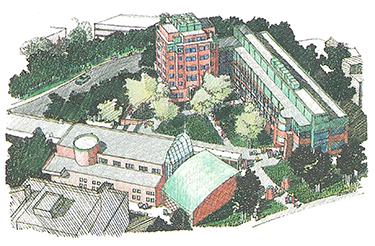Governor requests 6% budget cut; UW, lawmakers wait for revenue forecast

An artist’s sketch of a $65-million physics building to be built at the comer of 15th Avenue NE. and NE. Pacific Street. Money for the three-wing complex is included in Gov. Gardner’s budget proposal.
UW officials are anxiously waiting for the March 19 state revenue forecast, as the Washington State Legislature begins to write its budget for the UW and all state agencies.
Bob Edie, the UW director of government relations, is hoping that higher than expected revenue levels will improve the chances for the University’s budget, which Gov. Booth Gardner recommended cutting 6 percent in his December budget proposal.
Since June, state revenue projections have been dropping. In order to balance his budget, Gardner has chosen to make cuts in programs and ask for modest salary increases rather than raise taxes. Edie says a 6 percent cut from current operating levels would mean a $40 million reduction at the UW. “We’ve had some important gains made in the last four years that are in jeopardy if the legislature were to adopt the governor’s budget request,” he says.
Instructional support programs would be hit hard, and perhaps 300 to 500 staff would be at risk, he warns. “Over the last four years the state has added $50 million, separate from salary increases, to the base budget at the University,” Edie explains. That money was devoted primarily to improvements in undergraduate education, minority recruitment and computing.
For example, the University was able to offer more science lab sections in basic courses, smaller language classes and more discussion sections for large lecture courses. “A 6 percent cut would eliminate most of those improvements,” Edie says. When the governor released his budget, President William P. Gerberding commented, “It is no secret that the governor’s proposals for higher education operating budgets are disappointing to us. They put in jeopardy the vitally important gains of the last two biennia.”
However, Edie adds, “In light of the investment made over the last four years, we have some confidence that the legislature will make substantial improvements in the budget for higher education. They are reluctant to step backwards on a problem they have been solving—making higher education more competitive.”
The governor’s budget includes a salary increase of approximately 4 percent for faculty and staff in each year of the 1991-93 biennium. Gardner also called for more students and programs at UW branch campuses. A bachelor’s degree in nursing would begin at the Tacoma branch in fall 1992 and a bachelor’s degree in engineering would start at the Bothell branch that same fall.
“The governor recognized that the branch campuses need time to develop,” Edie says. “In order for the branch campuses to succeed, they need a broader range of offerings.” Currently the branches offer courses at the junior and senior level leading to a general studies B.A.
The University’s building program got a boost from the governor’s capital budget, which would fund a $65-million physics building and a $19-million power plant boiler. In addition, Gardner’s six-year building program funds a computer science/ electrical engineering facility that would be completed by 1997 at a cost of about $93 million.
The University also supports Gardner’s proposal to raise the state’s long-term debt limit. The added bonding authority could finance a new fisheries building, a new science facility and major remodels of Hutchinson and Savery halls.
Since lawmakers will get down to serious budget considerations after the March 19 forecast, now is a good time for citizens to make their voices heard. Washington state residents can contact lawmakers directly by calling 1-800-562-6000.
Alumni who would like further information about the UW budget may contact the Alumni Legislative Support Network, in Seattle at 543- 0540 or outside of Seattle at 1-800- AUW-ALUM.